九年级英语Unit 14 2d
- 格式:pptx
- 大小:334.88 KB
- 文档页数:17
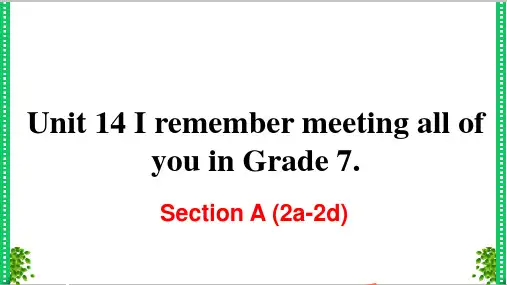
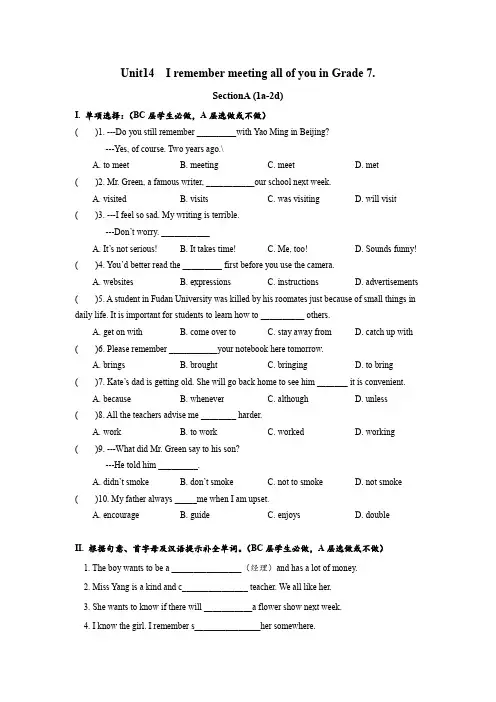
Unit14 I remember meeting all of you in Grade 7.SectionA (1a-2d)I. 单项选择:(BC层学生必做,A层选做或不做)( )1. ---Do you still remember _________with Yao Ming in Beijing?---Yes, of course. Two years ago.\A. to meetB. meetingC. meetD. met( )2. Mr. Green, a famous writer, ___________our school next week.A. visitedB. visitsC. was visitingD. will visit ( )3. ---I feel so sad. My writing is terrible.---Don’t worry. ___________A. It’s not serious!B. It takes time!C. Me, too!D. Sounds funny! ( )4. You’d better read the _________ first before you use the camera.A. websitesB. expressionsC. instructionsD. advertisements ( )5. A student in Fudan University was killed by his roomates just because of small things in daily life. It is important for students to learn how to __________ others.A. get on withB. come over toC. stay away fromD. catch up with ( )6. Please remember ___________your notebook here tomorrow.A. bringsB. broughtC. bringingD. to bring ( )7. Kate’s dad is getting old. She will go back home to see him _______ it is convenient.A. becauseB. wheneverC. althoughD. unless( )8. All the teachers advise me ________ harder.A. workB. to workC. workedD. working ( )9. ---What did Mr. Green say to his son?---He told him _________.A. didn’t smokeB. don’t smokeC. not to smokeD. not smoke ( )10. My father always _____me when I am upset.A. encourageB. guideC. enjoysD. doubleII. 根据句意、首字母及汉语提示补全单词。
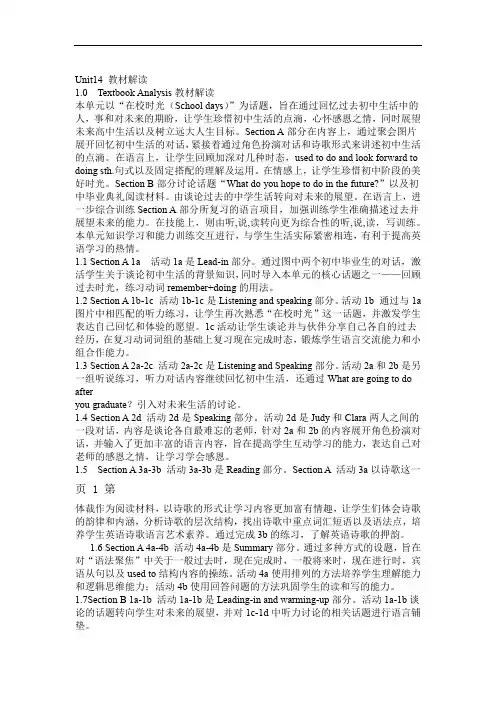
Unit14 教材解读1.0Textbook Analysis教材解读本单元以“在校时光(School days)”为话题,旨在通过回忆过去初中生活中的人,事和对未来的期盼,让学生珍惜初中生活的点滴,心怀感恩之情,同时展望未来高中生活以及树立远大人生目标。
Section A部分在内容上,通过聚会图片展开回忆初中生活的对话,紧接着通过角色扮演对话和诗歌形式来讲述初中生活的点滴。
在语言上,让学生回顾加深对几种时态,used to do and look forward to doing sth.句式以及固定搭配的理解及运用。
在情感上,让学生珍惜初中阶段的美好时光。
Section B部分讨论话题“What do you hope to do in the future?”以及初中毕业典礼阅读材料。
由谈论过去的中学生活转向对未来的展望。
在语言上,进一步综合训练Section A部分所复习的语言项目,加强训练学生准确描述过去并展望未来的能力。
在技能上,则由听,说,读转向更为综合性的听,说,读,写训练。
本单元知识学习和能力训练交互进行,与学生生活实际紧密相连,有利于提高英语学习的热情。
1.1Section A 1a 活动1a是Lead-in部分。
通过图中两个初中毕业生的对话,激活学生关于谈论初中生活的背景知识,同时导入本单元的核心话题之一——回顾过去时光,练习动词remember+doing的用法。
1.2Section A 1b-1c 活动1b-1c是Listening and speaking部分。
活动1b 通过与1a 图片中相匹配的听力练习,让学生再次熟悉“在校时光”这一话题,并激发学生表达自己回忆和体验的愿望。
1c活动让学生谈论并与伙伴分享自己各自的过去经历,在复习动词词组的基础上复习现在完成时态,锻炼学生语言交流能力和小组合作能力。
1.3Section A 2a-2c 活动2a-2c是Listening and Speaking部分。
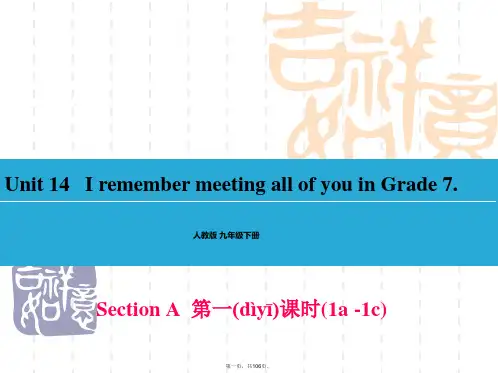
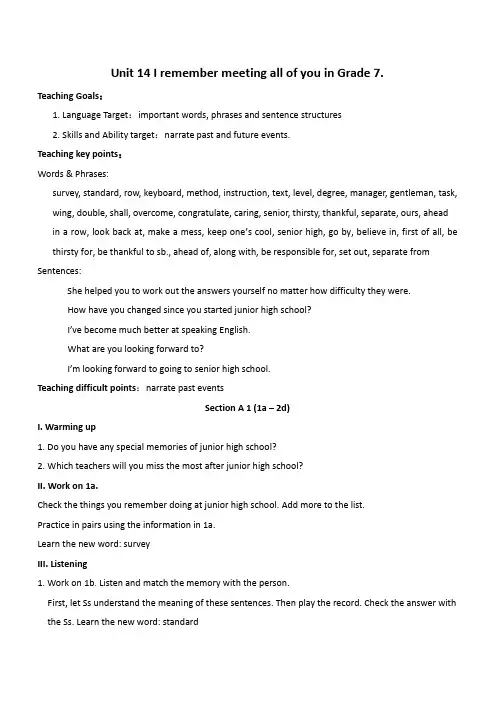
Unit 14 I remember meeting all of you in Grade 7.Teaching Goals:1. Language Target:important words, phrases and sentence structures2. Skills and Ability target:narrate past and future events.Teaching key points:Words & Phrases:survey, standard, row, keyboard, method, instruction, text, level, degree, manager, gentleman, task, wing, double, shall, overcome, congratulate, caring, senior, thirsty, thankful, separate, ours, ahead in a row, look back at, make a mess, keep one’s cool, senior high, go by, believe in, first of all, be thirsty for, be thankful to sb., ahead of, along with, be responsible for, set out, separate from Sentences:She helped you to work out the answers yourself no matter how difficulty they were.How have you changed since you started junior high school?I’ve become much better at speaking English.What are you looking forward to?I’m looking forward to going to senior high school.Teaching difficult points:narrate past eventsSection A 1 (1a – 2d)I. Warming up1. Do you have any special memories of junior high school?2. Which teachers will you miss the most after junior high school?II. Work on 1a.Check the things you remember doing at junior high school. Add more to the list.Practice in pairs using the information in 1a.Learn the new word: surveyIII. Listening1. Work on 1b. Listen and match the memory with the person.First, let Ss understand the meaning of these sentences. Then play the record. Check the answer with the Ss. Learn the new word: standard2. Listen again and answer the questions.3. Work on 1c.I remember...scoring two goals in a row during a soccer competition. winning a basketball competition.putting a plastic snake into a classmate's desk. getting a wish card in Christmas Day.I have...learned to play the keyboard in music class. learned to sing many English songs.learned to play basketball with my friends.4. Work on 2a. Listen to the conversation. Check(√) the facts you hear.5. Work on 2b. Listen again. Match each question with the name of the person.6. Listen again and fill in the blanks.IV. Practice1. Work on 2c. Role-play a conversation in your group using the information in 2a and 2b.Learn the new word: instruction.2. Work on 2d. Role-play the conversation.Let Ss read the text and answer the questions.V. Language points1. I remember scoring two goals in a row during a soccer competition.2. … I put in more effort and my exam scores doubl ed. double v. &adj.3. Shall we get each of them a card and gift to say thank you? shall modal v.VI. Homework: Recite the conversation in 2d.Section A 2 (3a–3b)I.Revisionschool survey; in a row; meet the standard; take a break; clear instructions; be patient with sb; work out; guide sb to do; put in more effortII. Warming upWhat activities can the writer remember about his or her life in junior high?I remember…III. Reading1. Work on 3a. Read the passage and answer the questions.1) What kind of writing is this?2) What is the main subject of this writing?3)Who do you think the writer is?2. Work on 3b. Read the poem again. Write the words that rhyme with the words.3. Work on 3c. Have you experienced any of the following things? How did you feel?How does the writer feel about them?IV. Language points1. look back at 回顾on time准时in time 及时2. I remember the excitement / Pride of overcoming fear3. remember doing sth. & remember to do sth.4. have fun = have a great time+doing5. keep one’s cool 沉住气;保持冷静cool用作名词。
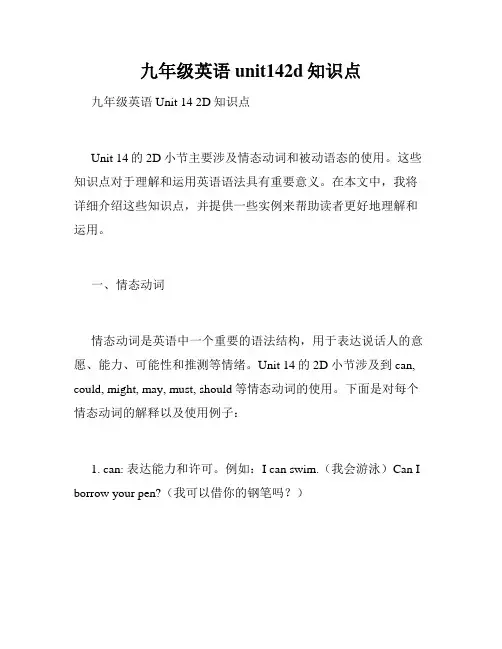
九年级英语unit142d知识点九年级英语Unit 14 2D知识点Unit 14的2D小节主要涉及情态动词和被动语态的使用。
这些知识点对于理解和运用英语语法具有重要意义。
在本文中,我将详细介绍这些知识点,并提供一些实例来帮助读者更好地理解和运用。
一、情态动词情态动词是英语中一个重要的语法结构,用于表达说话人的意愿、能力、可能性和推测等情绪。
Unit 14的2D小节涉及到can, could, might, may, must, should等情态动词的使用。
下面是对每个情态动词的解释以及使用例子:1. can: 表达能力和许可。
例如:I can swim.(我会游泳)Can I borrow your pen?(我可以借你的钢笔吗?)2. could: 表达过去的能力、请求和委婉的建议。
例如:When I was younger, I could run faster.(当我年轻的时候,我跑得更快)Could you help me with my homework?(你能帮我做作业吗?)3. may/might: 表达可能性和请求允许。
例如:It may rain tomorrow.(明天可能会下雨)Might I ask for your permission?(我可以请你允许吗?)4. must: 表达必须、推测和肯定性。
例如:You must finish your homework before going out.(你必须在外出之前完成作业)It's getting dark. They must have arrived.(天色变暗了,他们一定已经到了。
)5. should: 表达建议和责任。
例如:You should eat more vegetables for your health.(为了你的健康,你应该多吃蔬菜。
)We should help those in need.(我们应该帮助那些需要帮助的人。
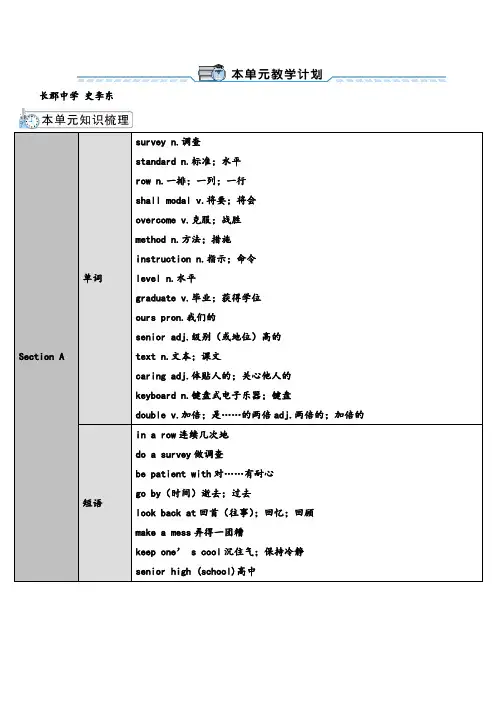
长郡中学史李东Section A 单词survey n.调查standard n.标准;水平row n.一排;一列;一行shall modal v.将要;将会overcome v.克服;战胜method n.方法;措施instruction n.指示;命令level n.水平graduate v.毕业;获得学位ours pron.我们的senior adj.级别(或地位)高的text n.文本;课文caring adj.体贴人的;关心他人的keyboard n.键盘式电子乐器;键盘double v.加倍;是……的两倍adj.两倍的;加倍的短语in a row连续几次地do a survey做调查be patient with对……有耐心go by(时间)逝去;过去look back at回首(往事);回忆;回顾make a mess弄得一团糟keep one’ s cool沉住气;保持冷静senior high (school)高中句型1. First of all, I’d like to congratulate all the students who are heretoday. 首先,我想祝贺今天在场的所有学生。
2. You’ve all grown up so much and I’m so proud ofyou. 你们都成长了很多,我为你们感到无比自豪。
3. I don’t need to tell you tha life in senior high school will be harderand that you have many difficult tasks ahead of you. 不需要我说你们也知道高中的生活将更加艰苦,在你们面前会有许多艰巨的任。
语法特殊疑问的用法;一般现在时;一般过去时;一般将来时知识目标特殊疑问句的用法;复习一般现在时、一般过去时和一般将来时的用法。
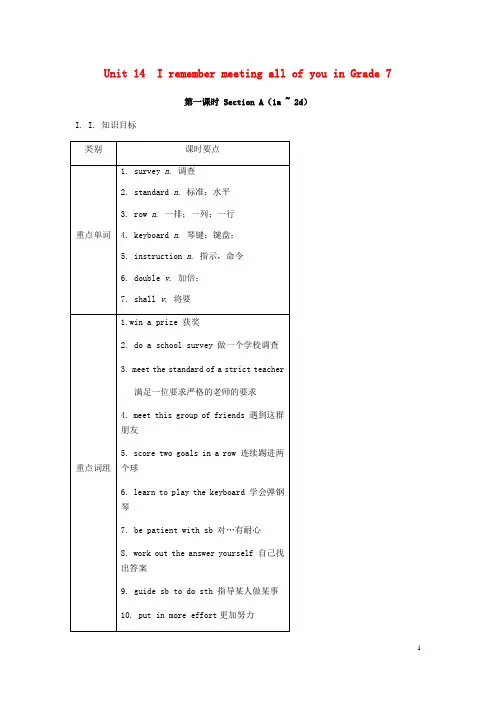
Unit 14 I remember meeting all of you in Grade 7第一课时 Section A(1a ~ 2d)I. I. 知识目标II. 课堂环节§自主学习方案【自学自查】根据汉语提示完成单词。
1. The students are doing a school survey(调查)about their eating hobbits.2. The workers are making the products carefully to meet the standard(标准)of the international.3. He father was so angry that he broke the keyboard(键盘)of his computer.4. This page has the clear instruction(说明)of this kind of medicine.5. The man did the same job as us but was paid double(双倍的).§课堂导学方案Step 1 情景导入(参考案例)用多媒体给学生播放一些七至九年学生们学校活动的录像或照片,然后询问同学们还记得哪些学校活动。
Teacher:Your junior high school days are over. Do you have any special memories?Students: : I remember____.① winning a prize② take part in the school trip③get into a fight with my friends……环节说明:通过视频和课前的一个师生问答互动引入新课的话题Step 2 完成教材1a-1c的任务【操作案例】1. 要求学生翻开课本P105,迅速阅读1a部分的内容。
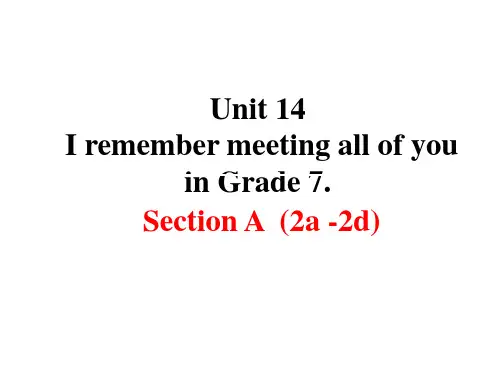
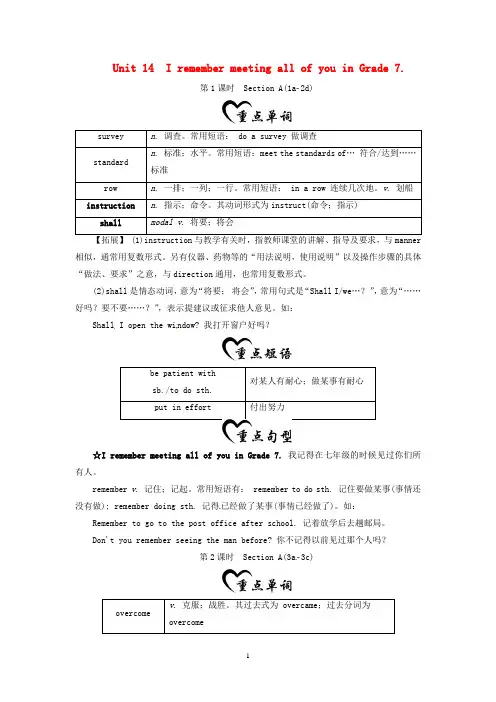
Unit 14 I remember meeting all of you in Grade 7.第1课时Section A(1a2d)survey n. 调查。
常用短语: do a survey 做调查standard n. 标准;水平。
常用短语:meet the standards of…符合/达到……标准row n. 一排;一列;一行。
常用短语: in a row 连续几次地。
v. 划船instruction n. 指示;命令。
其动词形式为instruct(命令;指示) shall modal v. 将要;将会【拓展】 (1)instruction与教学有关时,指教师课堂的讲解、指导及要求,与manner 相似,通常用复数形式。
另有仪器、药物等的“用法说明,使用说明”以及操作步骤的具体“做法、要求”之意,与direction通用,也常用复数形式。
(2)shall是情态动词,意为“将要;将会”,常用句式是“Shall I/we…?”,意为“……好吗?要不要……?”,表示提建议或征求他人意见。
如:Shall I open the wi ndow? 我打开窗户好吗?be patient withsb./to do sth.对某人有耐心;做某事有耐心put in effort 付出努力☆I remember meeting all of you in Grade 7. 我记得在七年级的时候见过你们所有人。
remember v. 记住;记起。
常用短语有: remember to do sth. 记住要做某事(事情还没有做); remember doing sth. 记得已经做了某事(事情已经做了)。
如:Remember to go to the post office after school. 记着放学后去趟邮局。
Don't you remember seeing the man before? 你不记得以前见过那个人吗?第2课时Section A(3a3c)overcome v. 克服;战胜。
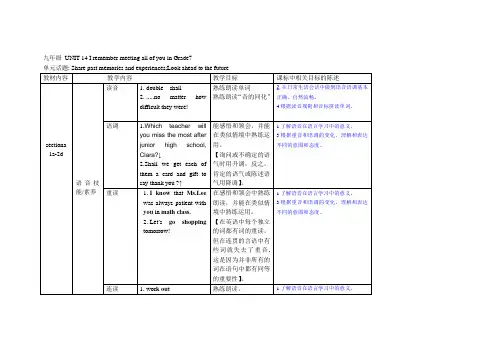
Unit 14 I remember meeting all of you in Grade 7.第1课时Section A(1a2d)survey n. 调查。
常用短语:do a survey 做调查standard n. 标准;水平。
常用短语:meet the standards of…符合/达到……标准row n. 一排;一列;一行。
常用短语:in a row 连续几次地。
v. 划船instruction n. 指示;命令。
其动词形式为instruct(命令;指示)shall modal v. 将要;将会【拓展】(1)instruction与教学有关时,指教师课堂的讲解、指导及要求,与manner 相似,通常用复数形式。
另有仪器、药物等的“用法说明,使用说明”以及操作步骤的具体“做法、要求”之意,与direction通用,也常用复数形式。
(2)shall是情态动词,意为“将要;将会”,常用句式是“Shall I/we…?”,意为“……好吗?要不要……?”,表示提建议或征求他人意见。
如:Shall I open the wi ndow? 我打开窗户好吗?be patient withsb./to do sth.对某人有耐心;做某事有耐心put in effort 付出努力☆I remember meeting all of you in Grade 7. 我记得在七年级的时候见过你们所有人。
remember v. 记住;记起。
常用短语有:remember to do sth. 记住要做某事(事情还没有做); remember doing sth. 记得已经做了某事(事情已经做了)。
如:Remember to go to the post office after school. 记着放学后去趟邮局。
Don't you remember seeing the man before? 你不记得以前见过那个人吗?第2课时Section A(3a3c)overcomev. 克服;战胜。
人教版九年级英语14单元2d知识点Unit 14 Lesson 2d from People's Education Press: A Closer Look at the Key PointsIn this article, we will take a closer look at the key points covered in Unit 14 Lesson 2d of the 9th-grade English textbook published by People's Education Press. This lesson focuses on grammar and vocabulary related to expressing opinions and preferences.Firstly, let's explore the grammar aspect of this lesson. The main grammar topic covered is the use of "would rather" and "prefer." These expressions are commonly used to express preferences and choices. "Would rather" is followed by a bare infinitive verb, while "prefer" is followed by a gerund. For example, "I would rather go to the beach" and "She prefers shopping with friends." These structures are essential to master as they are frequently used in both written and spoken English.Moving on to vocabulary, this lesson introduces useful words and phrases to express opinions. Some of the key phrases covered include "in my opinion," "I think," "I believe," and "from my point of view." These phrases are commonly used to express personal viewpoints and can be used in various situations, such as discussions, debates, andessays. It is crucial to understand the appropriate usage of these phrases to accurately convey one's thoughts and ideas.Furthermore, the lesson presents a range of adjectives to describe personal preferences. These adjectives include "exciting," "boring," "enjoyable," "interesting," and "fun." Understanding these adjectives and their appropriate usage can enhance one's ability to express preferences and opinions. It is essential to remember that adjectives should agree in number and gender with the nouns they modify, ensuring consistency and accuracy in communication.In addition to grammar and vocabulary, this lesson also highlights the importance of linking words and phrases when expressing opinions. Transitional words and phrases, such as "in addition," "moreover," "furthermore," and "on the other hand," help provide a logical flow to our thoughts and arguments. Understanding and appropriately using these linking words and phrases can greatly improve the coherence and cohesion of one's writing and speaking.To further enhance language skills, this lesson encourages students to engage in conversations, debates, and presentations where they can express their opinions freely. Through these exercises, students can practice utilizing the grammar and vocabulary learned in the lessonwhile also honing their speaking and listening skills. These activities provide practical opportunities for students to apply what they have learned in real-life situations.Finally, this lesson emphasizes the importance of respect and consideration when expressing opinions. Students are encouraged to listen attentively to others' viewpoints and respond respectfully, even when they disagree. This ensures a healthy and productive exchange of ideas, promoting a cooperative and inclusive learning environment.In conclusion, Unit 14 Lesson 2d of the 9th-grade English textbook published by People's Education Press provides valuable insights into expressing opinions and preferences. The key points covered include the use of "would rather" and "prefer," vocabulary related to expressing opinions, adjectives for describing preferences, linking words and phrases, and the importance of respectful communication. By mastering these concepts and applying them in various situations, students can enhance their language skills and become effective communicators in English.。